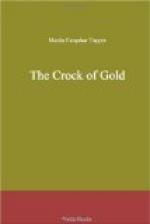“Well, Aunt Quarles, is it your meaning to undertake a new master?”
“Don’t know, nephy—can’t say yet what he’ll be like: if he’ll leave us as we are, won’t say wont.”
“Ay, as we are, indeed; comfortable quarters, and some little to put by, too: a pretty penny you will have laid up all this while, I’ll be bound: I wager you now it is a good five hundred, aunt—come, done for a shilling.”
“Get along, foolish boy; a’n’t you o’ the tribe o’ wisdom too—ha, ha, ha!”
“I will not say,” smirked Simon, “that my nest has not a feather.”
“It’s easy work for us, Nep; we hunt in couples: you the men, and I the maids—ha, ha!”
“Tush, Aunt Bridget! that speech is not quite gallant, I fear.” And the worshipful extortioners giggled jovially.
“But it’s true enough for all that, Simon: how d’ye manage it, eh, boy? much like me, I s’pose; wages every quarter from the maids, dues from tradesmen Christmas-tide and Easter, regular as Parson Evans’s; pretty little bits tacked on weekly to the bills, beside presents from every body; and so, boy, my poor forty pounds a-year soon mounts up to a hundred.”
“Ay, ay, Aunt Bridget—but I get the start of you, though you probably were born a week before-hand: talk of parsons, look at me, a regular grand pluralist monopolist, as any bishop can be; butler in doors, bailiff out of doors, land-steward, house-steward, cellar-man, and pay-master. I am not all this for naught, Aunt Quarles: if so much goes through my fingers, it is but fair that something stick.”
“True, Simon—O certainly; but if you come to boasting, my boy, I don’t carry this big bunch o’ keys for nothing neither. Lord love you! why merely for cribbings in the linen-line for one month, John Draper swapped me that there shawl: none o’ my clothes ever cost me a penny, and I a’n’t quite as bare as a new-born baby neither. Look at them trunks, bless you!”
“Ay, ay, aunt, I’ll be bound the printer of your prayer-book has left out a ‘not,’ before the ‘steal,’ eh?—ha! ha!”
“Fie, naughty Simon, fie! them’s not stealings, them’s parquisites. Where’s the good o’ living in a great house else? But come, Si, haven’t you struck out the ‘not,’ for yourself, though the printer did his duty, eh, Nep?”
“Not a bit, aunt—not a bit: all sheer honesty and industry. Look at my pretty little truck-shop down the village. Wo betide the labourer that leaves off dealing there! not one that works at Hurstley, but eats my bread and bacon; besides the ‘tea, coffee, tobacco, and snuff.’”
“Pretty fairish articles, eh? I never dealt with you, Si: no, Nep, no—you never saw the colour o’ my money.”
Jennings gave a start, as if a thought had pricked him; but gayly recovering himself, said,
“Oh, as to pretty fairish, I know there is one thing about the bacon good enough; ay, and the bread too—the very best of prices; ha! ha! is not that good? And for the other genuine articles, I don’t know that much of the tea comes from China—and the coffee is sold ground, because it is burnt maize—and there’s a plenty of wholesome cabbage leaf cut up in the tobacco—while as for snuff, I give them a dry, peppery, choky, sneezy dust, and I dare say that it does its duty.”




